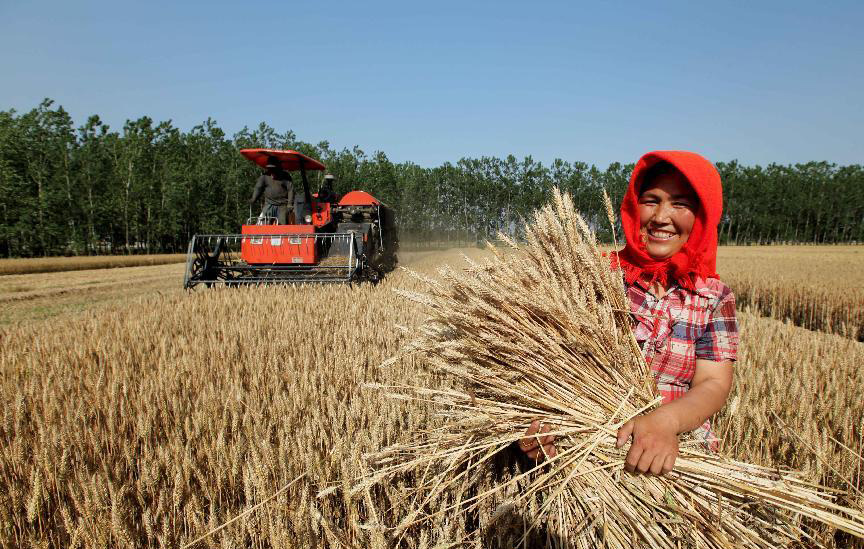Scholars counter pessimism with facts showing rural advances

Farmers harvest wheat in Dawa Village in Lianyungang City, Jiangsu Province, with the aid of agricultural machinery on June 6, 2015.
This Chinese Spring Festival has seen a number of sentimental reports on the changes occurring in rural China. However, there have also been some false, sensationalized online pieces about how traditional values have been discarded in villages and how unbearable rural China has become, stirring up a heated discussion in media.
Scholars have criticized such attempts to “bad mouth” rural China and have called it an inappropriate interpretation of rural development in the process of urbanization.
Deng Dacai, executive dean of the Institute of China Rural Studies at Central China Normal University, who is also in charge of “the hundred villages decade observation” project, said that according to their survey, a majority of farmers are pleased with their current lives and production.
Deng said rural development has achieved significant progress in various respects. Infrastructure in rural China has been improved as well as people’s houses while most farmers afford motorcycles, and some even buy cars.
In addition, social policy has been made to provide some government subsidies for farmers’ medical care and pensions, Deng noted.
“Compared to urban residents, the rural population still lags behind. However, the quality of life in rural China has had evident improvements,” said Wei Longbao, vice-dean of the China Academy of Rural Development at Zhejiang University.
According to the National Bureau of Statistics, rural resident’s annual disposable income per capita stood at 11,422 yuan (around $1,750) in 2015, an 8.9 percent increase over the previous year. After deducting price factors, there was a de facto 7.5 percent growth, leaving around 10,000 yuan disposable income per capita, once again outpacing GDP growth, Wei said.
As farmers’ living and production conditions rapidly improve thanks to the popularization of agricultural mechanization, farmers nowadays have spare time to seek a more spiritual life, Wei said.
Without basic methodology, some investigations and reports appear to be purely superficial and tend to overgeneralize, Deng said. Also, if urban lifestyles or an ideal lifestyle are used as reference points, the countryside might look far from satisfactory.
“In a way, a few vanishing villages are inevitable, whereas the flourishing of most of the countryside is the future and direction of China’s rural-urban integration. It is not objective to use what happens in one village or one incident in the village to represent the overall situation in rural China,” said Chen Wensheng, a research fellow of the Hunan Academy of Social Sciences.
Wei said that the attempts to smear rural China prompt us to reflect on rapid urbanization, vanishing villages and migrating farmers, which to some extent are intrinsic to the process of modernization.
Chen said some people judge rural areas with the highest moral standard and the ideal vision, so the sensationalized pieces were in fact a reflection of such a contrast.
Wei said the phenomena of vanishing villages and migrating farmers must be understood in a scientific manner because agricultural modernization, transfers of agricultural population, management of the rural environment and enhancement of infrastructure have already improved the socioeconomic outlook of rural China, gradually transforming the socioeconomic structure of urban and rural regions.
“Undoubtedly, there have been a lot of problems during the rapid development of rural China,” Chen said. However, there is an urgent need to figure out the accurate positioning and correct direction for rural social development by studying the trends in rural society, constructing institutional mechanisms for urban-rural intergation and common prosperity, and promoting the organic connections between traditional Chinese local culture and modern urban civilization, Chen added.
Wei said urbanization is a necessary process of human social development. For China, it is an indispensable part of modernization. Vanishing villages are only natural, and as long as they achieve harmonious and balanced development with urbanization, there should be no overreaction.
Zhang Jie is a reporter at the Chinese Social Sciences Today.
